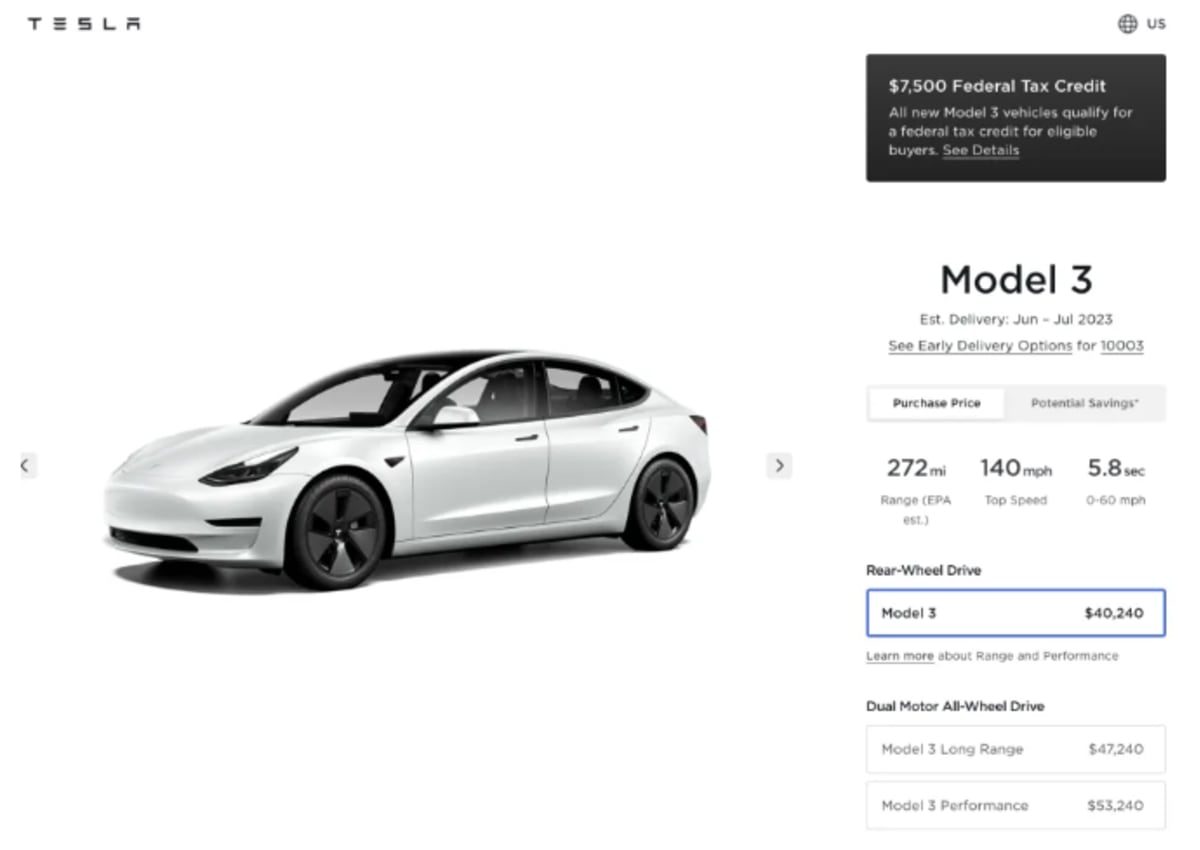Electric vehicle adoption is expected to reach a significant milestone when mainstream EVs become affordable, priced below $30,000. In the United States, this milestone has now been achieved for some buyers, thanks to government subsidies.
Recently, Tesla, a well-known manufacturer of electric vehicles, posted an announcement on its website. It stated that all variants of the Model 3 sedan are now eligible for the complete federal EV tax credit, which amounts to $7,500.
This is a significant change because, in the past, only the more affordable Model 3 Rear-Wheel Drive (RWD) version qualified for half of that tax credit. The federal government has also verified and acknowledged this update on its fueleconomy.gov website.
The federal government has specific requirements for the EV tax credit. It mandates that 40% of the critical minerals used in the vehicle must be extracted in the US or a country that has a free trade agreement with the US.
Additionally, 50% of the value of the battery components must be manufactured or assembled in North America.

While no explicit reason was given for the change in qualification, it can be assumed that Tesla made adjustments to the sourcing of materials for the batteries used in the Model 3 RWD or modified the assembly process for the battery packs.
Prior to this announcement, reports indicated that Tesla was utilizing LFP (lithium-ion phosphate) battery cells produced by China’s CATL.
The availability of affordable electric vehicles is considered crucial in driving mass adoption and reducing dependence on fossil fuels.
Lowering the price barrier allows a broader range of consumers to consider electric vehicles as a viable option for their transportation needs.
As electric vehicle technology continues to advance and production scales up, it becomes increasingly feasible to offer more affordable models without compromising on performance or range.
As electric vehicle technology continues to evolve, prices are expected to decrease further, making them increasingly accessible to a wider range of consumers.
Innovation in battery technology, increased production capacity, and economies of scale are some factors that contribute to the declining cost of electric vehicles.
Continued investment in research and development, along with supportive government policies, will play a crucial role in driving the affordability and adoption of electric vehicles in the coming years.
Tesla Model 3 Costs as Low as $23K
If certain criteria such as income restrictions and MSRP caps ($55,000 for cars; $80,000 for trucks and SUVs) are met, the inclusion of the full federal tax credit brings the cost of the Tesla Model 3 RWD to $32,740.
Although $32,740 is a relatively good deal considering the average price of new cars is around $45,000, there are additional incentives available for electric vehicles like the Model 3 that further reduce prices. For instance, New York state offers a Drive Clean Rebate of up to $2,000 for EVs, which the Model 3 qualifies for.
In California, there is an even more substantial incentive provided by the state in the form of a $7,500 tax rebate, which is subject to income and other requirements.
When both the federal and California state incentives are factored in, the price of the Model 3 drops to $25,240 – a figure that Reuters points out is below the starting price of a new Toyota Camry ($26,320).
Additionally, Tesla offers local incentives for specific vehicles in states like California. At present, Tesla provides a $2,410 incentive for the Model 3 RWD in Southern California, bringing the price of the car, including all tax incentives, down to an astonishing $22,830 for eligible buyers.
Tesla’s investors and analysts anticipate that its third-generation vehicle platform will attract a new market segment consisting of middle-class and younger buyers to electric vehicles.
Interestingly, it appears that some of these potential buyers, particularly in California, have the opportunity to acquire a Tesla at a significantly reduced price, at least for as long as the incentives remain available.
The recent announcement by Tesla regarding the eligibility of all versions of the Model 3 for the full federal EV tax credit marks a significant step towards achieving the goal of affordable electric vehicle adoption.











